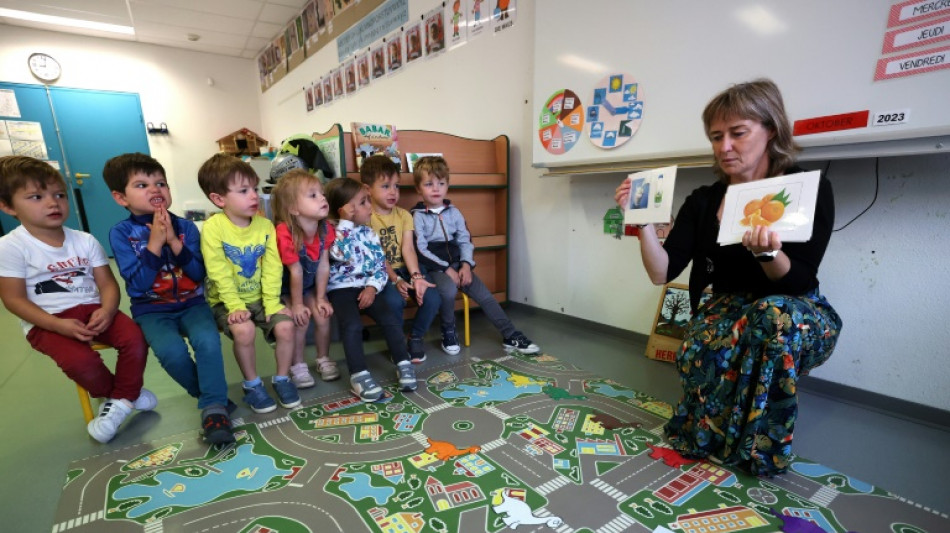
-
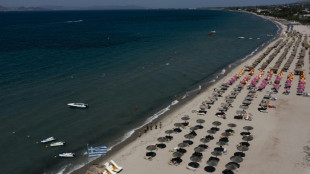 Greece set new tourism record in 2025
Greece set new tourism record in 2025
-
Zelensky says Ukraine unbroken after 4 years, but Russia vows to fight on

-
 Zelenksy says Ukraine unbroken after 4 years, but Russia vows to fight on
Zelenksy says Ukraine unbroken after 4 years, but Russia vows to fight on
-
Snoop Dogg 'can't wait' for first Swansea visit

-
 Stocks fluctuate as traders assess AI fallout, tariffs
Stocks fluctuate as traders assess AI fallout, tariffs
-
Post-it maker 3M faces Belgian trial over 'forever' chemicals

-
 UK comedian Russell Brand pleads not guilty to new rape, assault charges
UK comedian Russell Brand pleads not guilty to new rape, assault charges
-
Duterte drew up 'death lists', boasted about murders: ICC prosecutor

-
 UK govt urged to release documents linked to ex-prince Andrew
UK govt urged to release documents linked to ex-prince Andrew
-
Rights group slams treatment of viral Japanese monkey

-
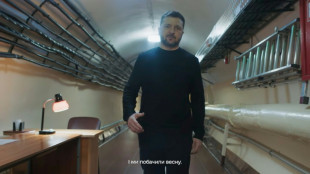 Inside the bunker where Zelensky led response to Russian invasion
Inside the bunker where Zelensky led response to Russian invasion
-
France demands explanation from US envoy over 'surprise' no-show
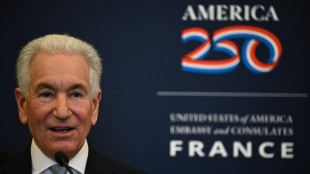
-
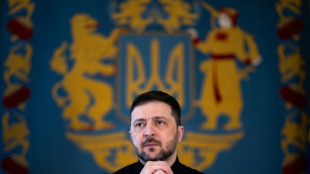 Putin failed to achieve goals in Ukraine, Zelensky says on war anniversary
Putin failed to achieve goals in Ukraine, Zelensky says on war anniversary
-
China tightens Japanese trade restrictions as spat worsens

-
 Ukraine war exhibition opens at Berlin Nazi bunker museum
Ukraine war exhibition opens at Berlin Nazi bunker museum
-
Jihadist threat puts eastern Senegal on edge

-
 Kim Yo Jong: the powerful sister behind North Korea's supreme leader
Kim Yo Jong: the powerful sister behind North Korea's supreme leader
-
North Korea ruling party promotes Kim Jong Un's younger sister

-
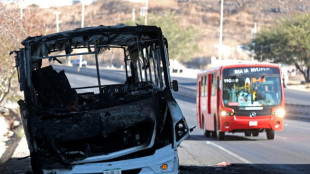 Mexico's Jalisco cautiously tries returning to normal after cartel violence
Mexico's Jalisco cautiously tries returning to normal after cartel violence
-
Mexico's violence-hit Guadalajara to host World Cup games
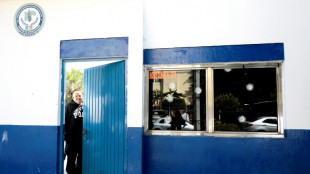
-
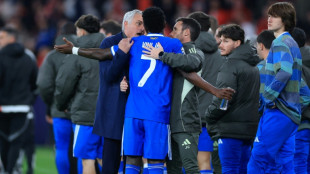 Mourinho's Bernabeu homecoming upended by suspension, racism row
Mourinho's Bernabeu homecoming upended by suspension, racism row
-
China targets Japanese companies over military ties

-
 Griezmann in talks to join MLS side Orlando City: source
Griezmann in talks to join MLS side Orlando City: source
-
France to revoke US envoy's govt access after summons no-show
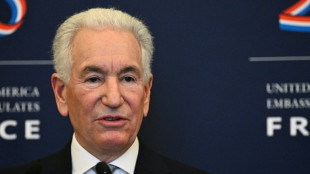
-
 Spurs overpower Pistons in clash of NBA's form teams
Spurs overpower Pistons in clash of NBA's form teams
-
Inoue to fight Nakatani in Tokyo in May: reports

-
 Canada PM to push trade, rebuild fractured ties in India trip
Canada PM to push trade, rebuild fractured ties in India trip
-
Asian markets mixed as traders weigh AI and tariffs outlook

-
 Votes may 'melt like snow': Reform, Greens eye Labour UK bastion
Votes may 'melt like snow': Reform, Greens eye Labour UK bastion
-
Venezuela says exiles welcome to return following mass amnesty

-
 Australia buys parts for future AUKUS sub reactor
Australia buys parts for future AUKUS sub reactor
-
Ukraine marks four years since Russian invasion

-
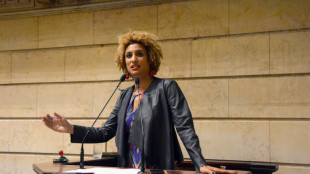 Brazil court to try politicians over hit on black councilwoman
Brazil court to try politicians over hit on black councilwoman
-
Interim president says Venezuelans welcome to return after amnesty law

-
 Man kills police officer in Moscow train station blast
Man kills police officer in Moscow train station blast
-
Despite drop in 2025, Russian oil exports exceed pre-war volumes: report

-
 ARIA Cybersecurity Announces Major Oil Refiner Deploys AZT PROTECT(TM)
ARIA Cybersecurity Announces Major Oil Refiner Deploys AZT PROTECT(TM)
-
Greene Concepts Announces Major Be Water Expansion in Walmart Stores Across the Southeast

-
 Fuse Battery Announces Amended Subscription Receipt Financing Details
Fuse Battery Announces Amended Subscription Receipt Financing Details
-
Lightwave Logic, Inc. Provides Update on Commercial Pipeline and Announces Timing of Fourth Quarter and Full Year 2025 Earnings Call

-
 Unlearn Advances Huntington's Disease AI Modeling Through Access to CHDI Foundation Data
Unlearn Advances Huntington's Disease AI Modeling Through Access to CHDI Foundation Data
-
Protagonist Therapeutics to Participate in Multiple Investment Bank Conferences in March 2026

-
 Specificity (OTCID:SPTY) to Present on the Emerging Growth Conference on February 26th, 2026.
Specificity (OTCID:SPTY) to Present on the Emerging Growth Conference on February 26th, 2026.
-
Havertys Reports Operating Results for Fourth Quarter 2025

-
 Viemed Healthcare Announces Year End 2025 Earnings Conference Call Details
Viemed Healthcare Announces Year End 2025 Earnings Conference Call Details
-
Galway Metals Drilling Intersects 9.0 g/t Gold Over 6.0m Beginning 15.0m from Surface at Southwest Deposit

-
 PeanutButterJelly Expands Affiliate Marketplace From 15 to 40 Affiliate Merchants; Website Sessions Rise 70%; Launches Conversion and Growth Optimization Plan
PeanutButterJelly Expands Affiliate Marketplace From 15 to 40 Affiliate Merchants; Website Sessions Rise 70%; Launches Conversion and Growth Optimization Plan
-
Digipower X Announces Uplisting to Cboe Canada

-
 Jaguar Mining Provides Update on Geologic Interpretation at the Chamé Gold Exploration Target, Brazil
Jaguar Mining Provides Update on Geologic Interpretation at the Chamé Gold Exploration Target, Brazil
-
Electrovaya Receives $10.5 Million P.O from Fortune 500 Customer


Long-banned Alsatian finally allowed in French schools
In a school in eastern France, teacher Sandra Cronimus greets her pupils every morning with a lusty "Guede morje!"
She is speaking Alsatian, the German dialect spoken widely in Alsace, a wealthy border region that France and Germany have fought over three times since 1870.
Long forbidden, the language that legendary Arsenal manager Arsene Wenger grew up speaking, is now being taught for the first time in French state schools.
"Clap your hands if you like going to school," Cronimus urged her class of three and four year olds, who responded to the roll with "Ich bin do" -- "I'm here" in Alsatian.
The 15 children at the Rainbow nursery school in Brumath, north of Strasbourg, are taught three-quarters of the time in either Alsatian or German, with the rest in French.
Three other schools near the city on the Rhine have also started teaching in Alsatian, a rarity in a country where regional languages have been pushed to the verge of extinction by a centralising state, ever-vigilant of threats to French national identity.
- 'They forbade us from speaking' -
Brumath's mayor Etienne Wolf is delighted by the change.
"When I was a child they forbade us from speaking Alsatian," said the 68-year-old.
"I want to defend Alsatian, which is falling away" particularly among young people, he added. "Often people understand it but don't speak it anymore."
Classroom assistant Corinne Husser is equally overjoyed to be able to speak her first language with the children. "It's great, it's the first time I have been able to work in Alsatian," she said.
While Alsatian is spoken by around half a million people, the dialect in Brumath is not exactly the same as the one spoken by Cronimus, who comes from a village in the northern Vosges.
And it is different again to what is spoken 150 kilometres (93 miles) to the south at the other end of the region. "In Altkirch it's completely different," said the teacher, who switches easily between German, Alsatian and French with the children.
Cronimus got extra training from language experts to take on "this new challenge".
Alsatian is already taught with German in a dozen community schools across Alsace run by the private ABCM network. Several take an immersive approach, with no French at all spoken in class.
- Rapid decline -
Pierre Klein, the president of the Alsace Bilingual Federation, said it was a pity that the state schools did not follow their lead as "they could have fully benefitted from the advantages of immersion".
Even so he welcomed the belated official "recognition of the value of being bilingual given the rapid decline in the use of the dialect... particularly among the under 50s."
However, Wolf said that the big problem with the completely immersive approach "is finding the people capable of teaching it".
Local education officials are already struggling to recruit teachers for bilingual French-German classes, in which one in five children in the Strasbourg area are taught.
Parents too were clearly worried about signing up for an experimental project.
"At the beginning only three pupils were signed up but before others were won over," said Cronimus.
Those that have signed up don't seem to be disappointed.
Celine Babin, 40, admitted that she "hesitated a little" before putting her son Paul into the class. Now, however, she is convinced it will help him with other languages. "And also, Alsatian is part of our culture," she added.
A.Mahlangu--AMWN



